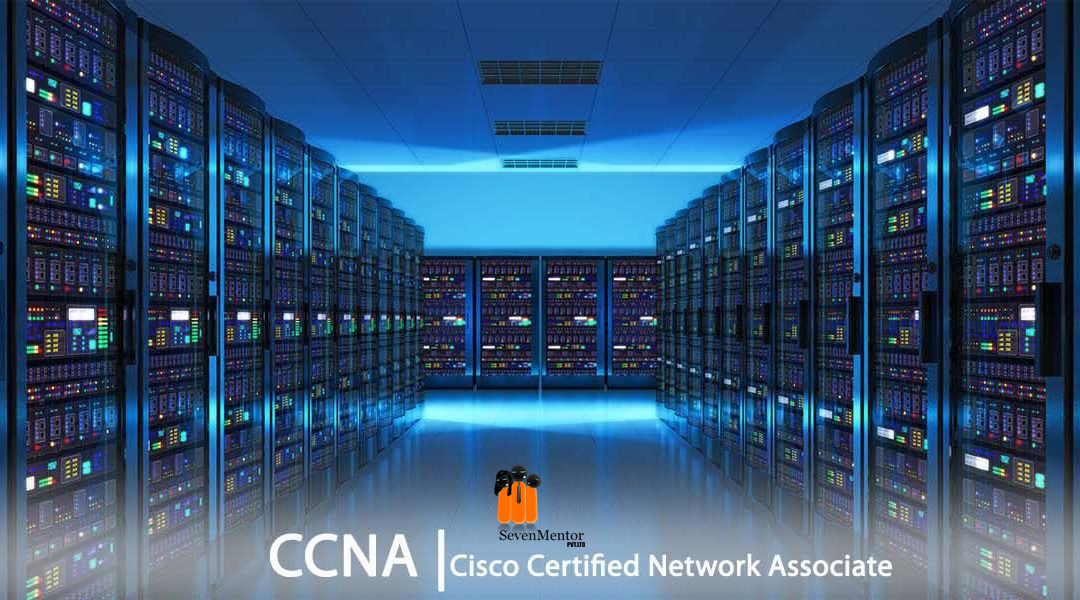CCNA
Cisco's CCNA (Cisco Certified Network Associate) certification is a cloud computing certification for employers or academics. The CCNA Accredition / Cisco Certificate validates your talents and understanding in connectivity underpinnings, troubleshooting, broadband internet, and IP telecommunications, and is completely customizable.
Call The Trainer
Batch Timing
- Regular: 2 Batches
- Weekends: 2 Batches
Request Call Back
Class Room & Online Training Quotation
About CCNA
The CCNA Certification is valid for two years, so qualifying holders must register for and pass a Cisco renewal examination with the same or better grade every 3 years to maintain their accreditation. Under the banner "Interlinking Cisco Network Devices Education," Cisco's curriculum alliances offer a variety of training options, featuring novels published by Cisco Publishing, as well as virtual and classroom programs.
What is the use of the Cisco Examination?
To get the CCNA Professional certification, candidates must pass Cisco exam #200-301. Following the qualifying of any proficiency test, candidates receive a scorecard that provides a scoring breakdown by qualification portion as well as the exam board passing score. The test measures the individual's capacity to construct, build, maintain, and restore an internet infrastructure for a small to medium-sized business. Among some of the subjects covered in this test are connectivity fundamentals, network connectivity, IP interconnection, IP services, security fundamentals, automation, and high scalability. As a result, it is critical to get expert assistance to pass this test and achieve the highest possible CCNA Academic results.
What will you learn in the CCNA Training at SevenMentor Institute?
The CCNA package incorporates anything you'll have to know to succeed in your CCNA Test 301. Authorized access Foundations, Methodologies, and Foundations are among the topics included in this CCNA practice syllabus. In-depth teaching is available on subjects such as Free Network Interconnection (FSI/OSI), Multiplex Transmission, Wiring Approaches, Access Layers, and many others. Protocols of TCP and DoD Architecture are covered in this hands-on course. We give students the best practical classes for Internet Protocols, Personal IP, Multicasting, IP Routing protocol, Content-based filtering, and other subjects with our precise CCNA Training in Jharkhand. Cisco Networking Boot procedure, Foreground And background Commands, Cisco Certified IOS, Terminal Connectivity, Map Routing, and Diagnostics are some of the most important topics covered while giving quality education to our learners for their upcoming CCNA Certifications. Several enrolled students in the CCNA Training classes in Jharkhand have indeed been capable of passing the CCNA test and receiving excellent marks. This is necessary for accurate and feature-rich material for the coursework. Come to the SevenMentor Institute in Jharkhand for the greatest training program that will ensure you a career and provide you with excellent employment options. CCNA experts are in demand in the business, and individuals who finish a recognized program may be considered for higher pay. You'll stand out in a crowd and get the job you want with SevenMentor's CCNA Certificate Program in Jharkhand. Over 900 students generally restarted their careers after putting their confidence in our training methodologies. It's now or never for you to undertake the important first step on your future career path. For a risk-free sample of the CCNA practice training, come visit the SevenMentor location in Jharkhand.
Why should you join SevenMentor for CCNA Course in Jharkhand?
Our CCNA Course in Jharkhand, provided by SevenMentor Institute, are indeed a one-stop destination for getting a suitable job. Students would be willing to set up, check, and troubleshoot devices, as well as build an Information system and Ip addressing scheme to match current requirements. They'll also learn how to configure, test, and troubleshoot Wifi technology. The CCNA Program in Jharkhand provides a highly employable, business curriculum for both college understudies and experienced CCNA professionals. Since the Cisco Certified Network Associate (CCNA) has a higher chance of landing a job in the IT industry, it is suggested to get the best CCNA Training in Jharkhand. In Jharkhand, completing the CCNA Training is the very first step forward towards a profession in new technologies. We offer comprehensive CCNA Certification Courses in Jharkhand that cover everything from fundamentals to advanced concepts in the CCNA Examination. These Cisco training sessions cover the CCNA Networking Foundation, Network Information, and CCNA Forwarding & Switching Technologies fundamentals. The Cisco Certified Program / Cisco CCNA Training Exercise is designed to help people improve, enhance, and analyze their own CCNA Professional network.
SevenMentor is one of the best CCNA training facilities in Jharkhand, with good job placement and examination passage guarantees, as well as experienced CCNA instructors who concentrate on covering the entire CCNA syllabus. CCNA Certified Training in Jharkhand covers both theoretical and practical aspects of communication, as well as a complete understanding of the foundations. The Training Course does have an 80:20 learning ratio, which indicates that offering CCNA training in Jharkhand utilizing Live CCNA Assignments prioritizes 80 % of the total practical work. We also provide Certified IT Professionals' CCNA Course in Jharkhand, which assist students in constructing networking, including installation, maintenance, and troubleshooting, as well as building connections using Cisco Components. After finishing the CCNA Course, a candidate will have an in-depth grasp of practical lessons about CCNA Routing and CCNA Troubleshooting. We also provide a Guaranteed Income with CCNA Certification, which will open up more opportunities in your career after you become Cisco certified. With the increasing internet world with huge up-gradation in all kinds of technology, CCNA Connectivity Courses / Certification Program provides the students with the appropriate access to new work prospects in IT areas.
Online Classes
SevenMentor Institute has built an interactive online CCNA Classes in Jharkhand and is committed to giving much more up-to-date material and specialized knowledge to all students in online classes. Learners can learn advanced Cisco-certified network methods from the convenience of their residences with the online CCNA training in Jharkhand. This CCNA institution in Jharkhand is committed to delivering you with a positive learning atmosphere and the most up-to-date education programs because then our students may test their creativity and talents in the area of CCNA. Whatever you'll need to perform as a CCNA Consultant wherever on the earth is included in our online CCNA Exam Preparation study. These online CCNA course in Jharkhand have already been meticulously created by our professionals and experts, who have merged their years of expertise and online training skills to provide you with a curriculum that will make you a Networking Analyst or Practitioner in Jharkhand. If you want to be a qualified CCNA executive, then must attend these Online CCNA Programs from the best CCNA Tutors in Jharkhand.
Course Eligibility
There is no such criteria for joining Online CCNA Training. CCNA is an associate or entry level certification exam for those who are planning to build their career in the most demanding field of networking.
- 10+2 students can go for CCNA Training
- Undergraduates and graduates
- Professionals who want switch
- Those who are interested in Networking
Syllabus of CCNA
Cisco Certified Network Associate (200-301)
Exam Description: The Cisco Certified Network Associate (CCNA) Routing
and Switching composite exam (200-301) is a 90-minute, 50–60 question
assessment that is associated with the CCNA Routing and Switching
certification. This exam tests a candidate's knowledge and skills related to
network fundamentals, LAN switching technologies, IPv4 and IPv6 routing
technologies, WAN technologies, infrastructure services, infrastructure
security, and infrastructure management .The following topics are general guidelines for the content likely to be
included on the exam. However, other related topics may also appear on any
specific delivery of the exam. In order to better reflect the contents of the
exam and for clarity purposes, the guidelines below may change at any time
without notice.
15% 1.0 Network Fundamentals
21% 2.0 LAN Switching Technologies
23% 3.0 Routing Technologies
10% 4.0 WAN Technologies
10% 5.0 Infrastructure Services
11% 6.0 Infrastructure Security
10% 7.0 Infrastructure Management
- 1.0 Network Fundamentals
- 1.1. Compare and contrast OSI and TCP/IP models
- 1.2. Compare and contrast TCP and UDP protocols
- 1.3. Describe the impact of infrastructure components in an enterprise network
- 1.3.1. Firewalls
- 1.3.2. Access points
- 1.3.3. Wireless controllers
- 1.4. Describe the effects of cloud resources on enterprise network architecture
- 1.4.1. Traffic path to internal and external cloud services
- 1.4.2. Virtual services
- 1.4.3. Basic virtual network infrastructure
- 1.5. Compare and contrast collapsed core and three-tier architectures
- 1.6. Compare and contrast network topologies
- 1.6.1. Star
- 1.6.2. Mesh
- 1.6.3. Hybrid
- 1.7. Select the appropriate cabling type based on implementation requirements
- 1.8. Apply troubleshooting methodologies to resolve problems
- 1.8.1. Perform and document fault isolation
- 1.8.2. Resolve or escalate
- 1.8.3. Verify and monitor resolution
- 1.9. Configure, verify, and troubleshoot IPv4 addressing and subnetting
- 1.10. Compare and contrast IPv4 address types
- 1.10.1. Unicast
- 1.10.2. Broadcast
- 1.10.3. Multicast
- 1.11. Describe the need for private IPv4 addressing
- 1.12. Identify the appropriate IPv6 addressing scheme to satisfy< addressing requirements in a LAN/WAN environment
- 1.13. Configure, verify, and troubleshoot IPv6 addressing
- 1.14. Configure and verify IPv6 Stateless Address Auto Configuration
- 1.15. Compare and contrast IPv6 address types
- 1.15.1. Global unicast
- 1.15.2. Unique local
- 1.15.3. Link local
- 1.15.4. Multicast
- 1.15.5. Modified EUI 64
- 1.15.6. Autoconfiguration
- 1.15.7. Anycast
- LAN Switching Technologies
- 2.1. Describe and verify switching concepts
- 2.1.1. MAC learning and aging
- 2.1.2. Frame switching
- 2.1.3. Frame flooding
- 2.1.4. MAC address table
- 2.2. Interpret Ethernet frame format
- 2.3. Troubleshoot interface and cable issues (collisions, errors, duplex, speed)
- 2.4. Configure, verify, and troubleshoot VLANs (normal/extended range) spanning multiple switches
- 2.4.1. Access ports (data and voice)
- 2.4.2. Default VLAN
- 2.5. Configure, verify, and troubleshoot interswitch connectivity
- 2.5.1. Trunk ports
- 2.5.2. Add and remove VLANs on a trunk
- 2.5.3. DTP, VTP (v1&v2), and 802.1Q
- 2.5.4. Native VLAN
- 2.6. Configure, verify, and troubleshoot STP protocols
- 2.6.1. STP mode (PVST+ and RPVST+)
- 2.6.2. STP root bridge selection
- 2.7. Configure, verify and troubleshoot STP related optional features
- 2.7.1. PortFast
- 2.7.2. BPDU guard
- 2.8. Configure and verify Layer 2 protocols
- 2.8.1. Cisco Discovery Protocol
- 2.8.2. LLDP
- 2.9. Configure, verify, and troubleshoot (Layer 2/Layer 3) EtherChannel
- 2.9.1. Static
- 2.9.2. PAGP
- 2.9.3. LACP
- 2.10. Describe the benefits of switch stacking and chassis aggregation
- 3.0 Routing Technologies
- 3.1. Describe the routing concepts
- 3.1.1. Packet handling along the path through a network
- 3.1.2. Forwarding decision based on route lookup
- 3.1.3. Frame rewrite
- 3.2. Interpret the components of a routing table
- 3.2.1. Prefix
- 3.2.2. Network mask
- 3.2.3. Next hop
- 3.2.4. Routing protocol code
- 3.2.5. Administrative distance
- 3.2.6. Metric
- 3.2.7. Gateway of last resort
- 3.3. Describe how a routing table is populated by different routing information sources
- 3.3.1. Admin distance
- 3.4. Configure, verify, and troubleshoot inter-VLAN routing
- 3.4.1. Router on a stick
- 3.4.2. SVI
- 3.5. Compare and contrast static routing & dynamic routing
- 3.6. Compare and contrast distance vector and link state routing protocols
- 3.7. Compare and contrast interior and exterior routing protocols
- 3.8. Configure, verify, and troubleshoot IPv4 and IPv6 static routing
- 3.8.1. Default route
- 3.8.2. Network route
- 3.8.3. Host route
- 3.8.4. Floating static
- 3.9. Configure, verify, and troubleshoot single area and multi-area OSPFv2 for IPv4 (excluding authentication, filtering, manual summarization, redistribution, stub, virtual-link, and LSAs)
- 3.10. Configure, verify, and troubleshoot single area and multi-area OSPFv3 for IPv6 (excluding authentication, filtering, manual summarization, redistribution, stub, virtual-link, and LSAs)
- 3.11. Configure, verify, and troubleshoot EIGRP for IPv4 (excluding authentication, filtering, manual summarization redistribution, stub)
- 3.12. Configure, verify, and troubleshoot EIGRP for IPv6 (excluding authentication, filtering, manual summarization redistribution, stub)
- 3.13. Configure, verify, and troubleshoot RIPv2 for Ipv4 (excluding authentication, filtering manual summarization, redistribution)
- 3.14. Troubleshoot basic Layer 3 end-to-end connectivity issues
- 4.0 WAN Technologies
- 4.1. Configure and verify PPP and MLPPP on WAN interfaces using local authentication
- 4.2. Configure, verify, and troubleshoot PPPoE client-side interfaces using local authentication
- 4.3. Configure, verify, and troubleshoot GRE tunnel connectivity
- 4.4. Describe WAN topology options
- 4.4.1. Point-to-point
- 4.4.2. Hub and spoke
- 4.4.3. Full mesh
- 4.4.4. Single vs dual-homed
- 4.5. Describe WAN access connectivity options
- 4.5.1. MPLS
- 4.5.2. Metro Ethernet
- 4.5.3. Broadband PPPoE
- 4.5.4. Internet VPN (DMVPN, site-to-site VPN, client VPN)
- 4.6. Configure and verify single-homed branch connectivity using eBGP IPv4 (limited to peering and route advertisement using Network command only)
- 4.7. Describe basic QoS concepts
- 4.7.1. Marking
- 4.7.2. Device trust
- 4.7.3. Prioritization
- A. Voice
- B. Video
- C. Data
- 4.7.4. Shaping
- 4.7.5. Policing
- 4.7.6. Congestion management
- 5.0 Infrastructure Services
- 5.1. Describe DNS lookup operation
- 5.2. Troubleshoot client connectivity issues involving DNS
- 5.3. Configure and verify DHCP on a router (excluding static reservations)
- 5.3.1. Server
- 5.3.2. Relay
- 5.3.3. Client
- 5.3.4. TFTP, DNS, and gateway options
- 5.4. Troubleshoot client- and router-based DHCP connectivity issues
- 5.5. Configure, verify, and troubleshoot basic HSRP
- 5.5.1. Priority
- 5.5.2. Preemption
- 5.5.3. Version
- 5.6. Configure, verify, and troubleshoot inside source NAT
- 5.6.1. Static
- 5.6.2. Pool
- 5.6.3. PAT
- 5.7. Configure and verify NTP operating in a client/server mode
- 6.0 Infrastructure Security
- 6.1. Configure, verify, and troubleshoot port security
- 6.1.1. Static
- 6.1.2. Dynamic
- 6.1.3. Sticky
- 6.1.4. Max MAC addresses
- 6.1.5. Violation actions
- 6.1.6. Err-disable recovery
- 6.2. Describe common access layer threat mitigation techniques
- 6.2.1. 802.1x
- 6.2.2. DHCP snooping
- 6.2.3. Nondefault native VLAN
- 6.3. Configure, verify, and troubleshoot IPv4 and IPv6 access list for traffic filtering
- 6.3.1. Standard
- 6.3.2. Extended
- 6.3.3. Named
- 6.4. Verify ACLs using the APIC-EM Path Trace ACL Analysis tool
- 6.5. Configure, verify, and troubleshoot basic device hardening
- 6.5.1. Local authentication
- 6.5.2. Secure password
- 6.5.3. Access to device
- A. Source address
- B. Telnet/SSH
- 6.5.4. Login banner
- 6.5.5. Describe device security using AAA with TACACS+ and RADIUS
- 7.1. Configure and verify device-monitoring protocols
- 7.1.1. SNMPv2
- 7.1.2. SNMPv3
- 7.1.3. Syslog
- 7.2. Troubleshoot network connectivity issues using ICMP echo-based IP SLA
- 7.3. Configure and verify device management
- 7.3.1. Backup and restore device configuration
- 7.3.2. Using Cisco Discovery Protocol or LLDP for device discovery
- 7.3.3. Licensing
- 7.3.4. Logging
- 7.3.5. Timezone
- 7.3.6. Loopback
- 7.4. Configure and verify initial device configuration
- 7.5. Perform device maintenance
- 7.5.1. Cisco IOS upgrades and recovery (SCP, FTP, TFTP, and MD5 verify)
- 7.5.2. Password recovery and configuration register
- 7.5.3. File system management
- 7.6. Use Cisco IOS tools to troubleshoot and resolve problems
- 7.6.1. Ping and traceroute with extended option
- 7.6.2. Terminal monitor
- 7.6.3. Log events
- 7.6.4. Local SPAN
- 7.7. Describe network programmability in enterprise network architecture
- 7.7.1. Function of a controller
- 7.7.2. Separation of control plane and data plane
- 7.7.3. Northbound and southbound APIs
Trainer Profile of CCNA
At SevenMentor, you can take either the teacher drove online training or classroom training. Aside from this, SevenMentor additionally offers corporate training for associations to upskill their workforce. All mentors at SevenMentor have a years important industry experience, and they have been effectively functioning as advisors in a similar space, which has made them topic specialists. You can have a demo lecture to check the quality of our trainers.
- Certified Professionals with more than 8+ Years of Experience
- Trained more than 2000+ students in a year
- Strong Theoretical & Practical Knowledge in their domains
- Expert level Subject Knowledge and fully up-to-date on real-world industry applications
CCNA Exams & Certification
SevenMentor Certification is Accredited by all major Global Companies around the world. We provide after completion of the theoretical and practical sessions to fresher’s as well as corporate trainees.
Our certification at SevenMentor is accredited worldwide. It increases the value of your resume and you can attain leading job posts with the help of this certification in leading MNC’s of the world. The certification is only provided after successful completion of our training and practical based projects.
Proficiency After Training
- Describe how Components Operate, identifying Important Elements, a function of network Elements, as well as the OSI reference model
- Employing the host-to-host Parcel delivery process, Clarify Problems related to increasing traffic on an Ethernet LAN and identify Changed LAN technology Alternatives into Ethernet networking Problems
- Describe the reasons for Expanding the reach of a LAN as well as the methods Which Can Be Utilized, with a focus on RF wireless Accessibility
- Explain the reasons for Linking networks Using routers and the Way routed networks transmit Information via networks using TCP / IP
- Explain the Use of WANs, the Significant Apparatus of WANs, Also configure PPP encapsulation, static and dynamic routing, PAT, and RIP routing
- Utilize the command-line Port to Detect neighbors on the Community and manage the router startup and Configuration
Key Features
Skill level
From Beginner to Expert
We are providing Training to the needs from Beginners level to Experts level.
Course Duration
12 weeks
Course will be 90 hrs to 110 hrs duration with real-time projects and covers both teaching and practical sessions.
Total Learners
2000+ Learners
We have already finished 100+ Batches with 100% course completion record.
Frequently Asked Questions
Batch Schedule
| DATE | COURSE | TRAINING TYPE | BATCH | CITY | REGISTER |
|---|---|---|---|---|---|
| 23/12/2024 |
CCNA |
Online | Regular Batch (Mon-Sat) | Jharkhand | Book Now |
| 24/12/2024 |
CCNA |
Online | Regular Batch (Mon-Sat) | Jharkhand | Book Now |
| 28/12/2024 |
CCNA |
Online | Weekend Batch (Sat-Sun) | Jharkhand | Book Now |
| 28/12/2024 |
CCNA |
Online | Weekend Batch (Sat-Sun) | Jharkhand | Book Now |
Students Reviews
Our curriculum is one of the most exciting and adequately prepared CCNA skills training in Jharkhand. Keep No reluctance, embrace them.
- Nilesh Chikne
Thank you, SevenMentor, for providing such an invaluable learning opportunity. I will return to your facility for additional training classes.
- Manali Khopade
Excellent instruction and resources for CCNA test training. Because of this flexible training, I received a high score.
- Jayshree Purohit
Course video & Images



Corporate Training
SevenMentor provides Corporate CCNA coaching in JharkhandCorporate CCNA Certification in Jharkhand, and then we will organize for almost all of your staff to be educated by the authorized institution. Corporate CCNA courses in Jharkhand are no longer viewed as a part-time undertaking for just any Jharkhand organization because we can instruct a big group of specialists in one place. We also provide training in areas like Wordpress, Weblog, Drupal, Mango, Libre Commerce, and many others, so that your worker has a thorough grasp of everything. So come in and get the best rates on the CCNA certification course for your organization, and you'll have trained staff with superior intellectual abilities for CCNA.
Our Placement Process

Eligibility Criteria

Placements Training

Interview Q & A

Resume Preparation

Aptitude Test

Mock Interviews

Scheduling Interviews

Job Placement

Related Courses
Have a look at all our related courses to learn from any location
CCNA Security class is the greatest training tool for engineers following the Cisco Certified Network Associate Security (CCNA Security) certification.
The CCNP Certification is just one among the vital certifications from Cisco a media professional must want to proceed in his profession.
An Advanced level in cisco certification-networking training is intended for professionals with prior experience in the networking field.
Request For Call Back
Class Room & Online Training Quotation

